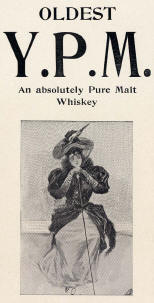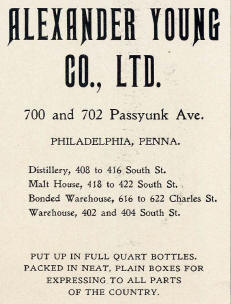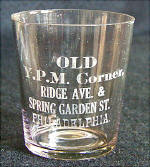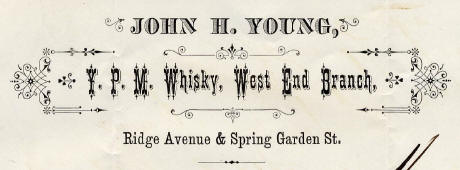|
|
 |
 |
Alexander Young Distilling Co. Inc., ca. 1824-1921
Difficult though it may be to believe today, Philadelphia was once a distilling powerhouse with at least five major spirits manufacturers to its name. The history of John Gibson's company and his establishment of the town, Gibsonton Mills, PA, has been well documented, but the other four have slipped into near oblivion over the interceding years. Indeed, there’s precious little evidence in the way of collectibles to show that they ever existed, making it difficult for anyone interested in pre-pro Philadelphia history to flesh out the details of their operations. The Alexander Young Co. mentioned in the preceding article has been the most opaque, or at least it was until recently.
Alexander Young was a native of County Derry, Ireland. He arrived on US shores in 1821 at the age of 22. It was not long before he built a still and somewhere around 1824 entered into partnership with John Maitland to begin commercial production of malt whiskey. Their distillery was located at 4 th & South Streets, within a large structure that had once seen life as a theatre. Their products were clearly a great success because the operations were gradually expanded and improved in succeeding years. In 1837, Maitland’s son took his father’s place in the partnership but ten years later he died and Alexander Young was left in sole control.
McElroy’s Philadelphia City Directory first began publication in the 1850s and lists Alexander Young as “Grain Distiller and Rectifier”. By 1865, he's billed as “Distiller of Y.P.M. Whiskies”. Young seems to have established such a strong brand recognition that the three letters YPM were all that were necessary to assure the quality of the product within. Bottles surviving from pre-pro years have no identifier other than a diagonal embossed banner that reads “Y.P.M.”. The acronym refers to “Young’s Pure Malt” whisky and appears on all surviving artifacts from the company. Not that there are many artifacts. The thimbleful shown on the previous page is the only known example of a shot and I have yet to see a corkscrew, a trade card, or even a letterhead.
|
|
 |
 |
The advertising reproduced here was published in 1892. Alexander Young died 1884 but the business continued operations as the Alexander Young Co. Ltd. with five capable family members at the helm. My collection includes a minutes book detailing many minutiae of the company’s activities over a 10-year period from 1887-1897. For example, Lewis T Young, Alexander’s youngest son, drew a President’s salary of $3,500 per annum. While that doesn’t sound excessive for 1890, he also received several times the figure in company stock dividends, one-time stockholder payouts, and from sales of personal property to the company! The minutes book was written in the hand of Wilson Young, secretary and treasurer of the board, but he also doubled as distiller, drawing an annual salary of $1,500. Workers on the distillery floor and salesroom were drawing around $15 per week at that time. The minutes record construction of a new 1,500 gallon still and worm tub on the South St. site, and also erection of the bonded warehouse at 616-622 Charles St, as indicated in the company advertising. The plans for the warehouse were drawn up by Geo. W. and W. S. Hewitt, Architects, and were implemented by George P. Payne & Co. at a cost of $22,399. The thimbleful in the preceding article records an address on Passyunk Ave. This was the original residence of Alexander Young and it also housed the Company store. A sum not exceeding $1,500 was approved for renovation of the storefront during 1890.
As was usual for the times, The Alexander Young Co. Ltd. was truly a family business. There were Youngs on the distillery floor and John H. Young, a grandson, ran the “Up town” store at Ridge Ave & Spring Garden Sts. A shot glass and letterhead from this establishment are shown below. John died sometime in the 1880’s, leaving behind a wife, Amelia and several young children, but the minutes showed that they were well provided for by the company.
 |
 |
The once thriving Alexander Young Distilling Co. Inc. died with Prohibition and slipped silently into the mists of time, like many proud old family businesses across the country. But should you run across a bottle with the letters “Y.P.M.” emblazoned across its face at a local show, at least you’ll now remember that it once contained a quart of Philly’s best (many thanks to David Young for providing details of early company history).